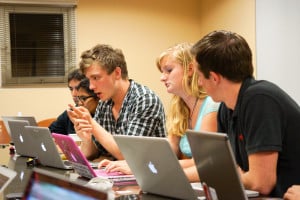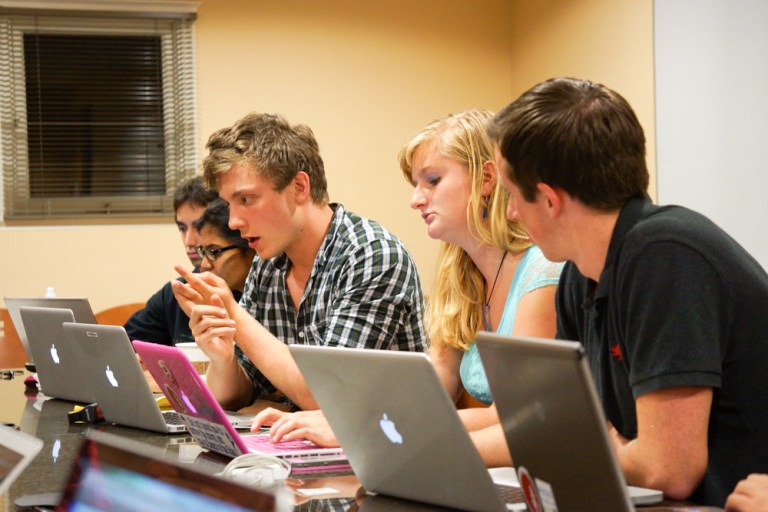
With three-quarters of their term in office completed, this year’s ASSU Executives and members of the 15th Undergraduate Senate sat down with The Daily to discuss their accomplishments in office to date and what remains to be done.
Executives’ focus on communication
ASSU Co-Presidents Dan Ashton ’14 and Billy Gallagher ’14 singled out their work in facilitating more efficient communication between University administrators and the student body, as well as within the ASSU.
“Something that was lacking was the complementary support from the structured student voice, which is the ASSU,” Gallagher said. “We wanted to make ASSU more accessible, more of that student voice.”
Ashton cited the accelerated selection of this year’s Nominations Commission (NomCom) — a group of seven students charged with selecting approximately 200 individuals to serve on University committees as student representatives — and a more extensive dialogue between NomCom members and the Executives as reflective of efforts to ensure student voices are properly heard.
“That is the highest impact we have — and all that is run through NomCom,” Ashton said.
Both Ashton and Gallagher also described their positive relationship and increased communications with the Senate as crucial to the success of several of their proposals and initiatives. For example, Ashton and Senator Ilya Mouzykantskii ’16 spearheaded discussions with University administrators over controversial proposed class scheduling changes.
“Bringing back the Executive Committee has been really helpful,” Gallagher noted, referencing a committee that brings together the Executives and the leaderships of the Senate, Graduate Student Council and Stanford Student Enterprises.
Ashton and Gallagher also emphasized other positive accomplishments from the first three-quarters of their term, such as the introduction of all-school tailgates before football games and work done with the Career Development Center to develop resources to assist students pursuing “social impact” careers.
Senate’s procedural improvements
The Senate has also focused on ways to make the legislative branch of the ASSU a more representative, efficient and effective organization, recently passing bills that reserve three Senate seats for upperclassmen — traditionally underrepresented in the body — and allow for senators to study abroad while serving, a restriction that has often been cited as further limiting the number of upperclassmen on Senate and increasing turnover from year to year.
Beyond changes to the elections process, much of the Senate’s attention has been focused on funding practices, with several senators pointing to the passage of the Student Activities Fee (SAFE) Reform as the biggest task left to accomplish.
The SAFE Reform would fundamentally restructure how student groups ask for and access money while also making the process by which the Senate can distribute those funds more efficient. Ashton and Gallagher said that they hope to have the SAFE Reform approved by the Senate in time for it to be voted on by the student body in the spring elections.
“There are a lot of non-existent, defunct groups that still have money in their accounts that can’t be touched,” Ashton noted.
As their time in office nears an end, however, several senators expressed frustration with the bureaucratic elements of both the University and the ASSU, and the ensuing difficulty of effecting substantive change.
“It is incredibly hard to get the status quo to change,” Mouzykantskii said.
Contact Andrew Vogeley at avogeley ‘at’ stanford ‘dot’ edu.
